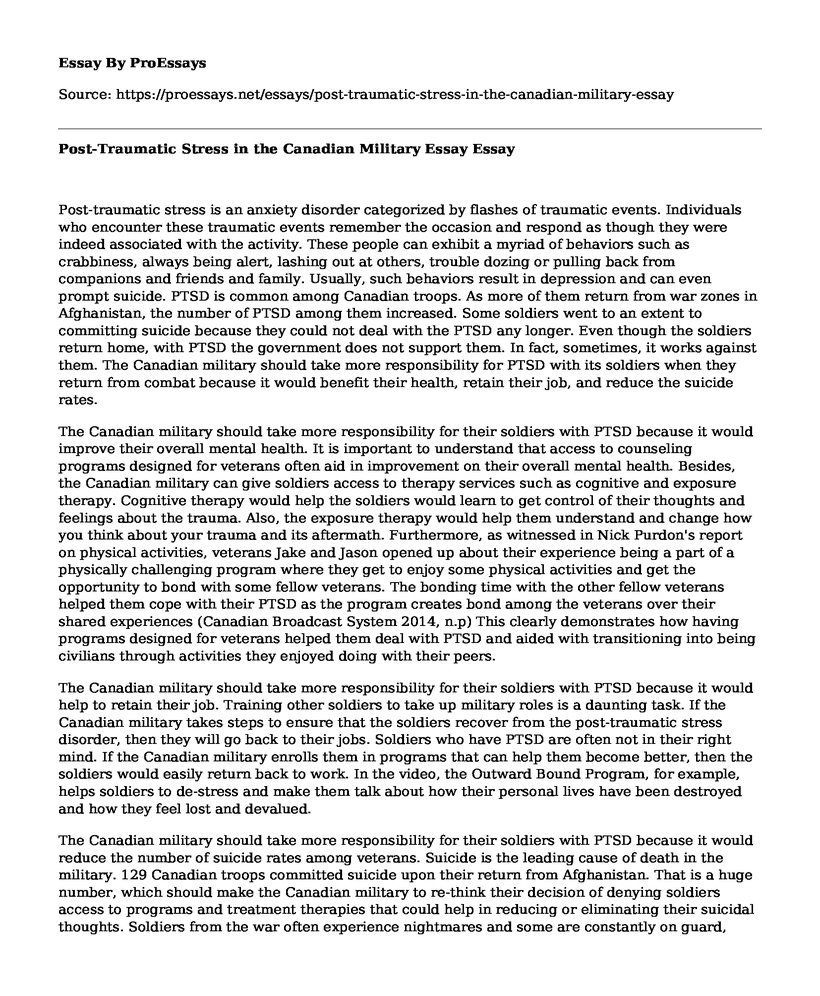Post-traumatic stress is an anxiety disorder categorized by flashes of traumatic events. Individuals who encounter these traumatic events remember the occasion and respond as though they were indeed associated with the activity. These people can exhibit a myriad of behaviors such as crabbiness, always being alert, lashing out at others, trouble dozing or pulling back from companions and friends and family. Usually, such behaviors result in depression and can even prompt suicide. PTSD is common among Canadian troops. As more of them return from war zones in Afghanistan, the number of PTSD among them increased. Some soldiers went to an extent to committing suicide because they could not deal with the PTSD any longer. Even though the soldiers return home, with PTSD the government does not support them. In fact, sometimes, it works against them. The Canadian military should take more responsibility for PTSD with its soldiers when they return from combat because it would benefit their health, retain their job, and reduce the suicide rates.
The Canadian military should take more responsibility for their soldiers with PTSD because it would improve their overall mental health. It is important to understand that access to counseling programs designed for veterans often aid in improvement on their overall mental health. Besides, the Canadian military can give soldiers access to therapy services such as cognitive and exposure therapy. Cognitive therapy would help the soldiers would learn to get control of their thoughts and feelings about the trauma. Also, the exposure therapy would help them understand and change how you think about your trauma and its aftermath. Furthermore, as witnessed in Nick Purdon's report on physical activities, veterans Jake and Jason opened up about their experience being a part of a physically challenging program where they get to enjoy some physical activities and get the opportunity to bond with some fellow veterans. The bonding time with the other fellow veterans helped them cope with their PTSD as the program creates bond among the veterans over their shared experiences (Canadian Broadcast System 2014, n.p) This clearly demonstrates how having programs designed for veterans helped them deal with PTSD and aided with transitioning into being civilians through activities they enjoyed doing with their peers.
The Canadian military should take more responsibility for their soldiers with PTSD because it would help to retain their job. Training other soldiers to take up military roles is a daunting task. If the Canadian military takes steps to ensure that the soldiers recover from the post-traumatic stress disorder, then they will go back to their jobs. Soldiers who have PTSD are often not in their right mind. If the Canadian military enrolls them in programs that can help them become better, then the soldiers would easily return back to work. In the video, the Outward Bound Program, for example, helps soldiers to de-stress and make them talk about how their personal lives have been destroyed and how they feel lost and devalued.
The Canadian military should take more responsibility for their soldiers with PTSD because it would reduce the number of suicide rates among veterans. Suicide is the leading cause of death in the military. 129 Canadian troops committed suicide upon their return from Afghanistan. That is a huge number, which should make the Canadian military to re-think their decision of denying soldiers access to programs and treatment therapies that could help in reducing or eliminating their suicidal thoughts. Soldiers from the war often experience nightmares and some are constantly on guard, which make them become suicidal. The memories of killings and brutalities during war give the soldiers negative attitudes towards life to the extent they do not see a point of living. In the video, one corporal affirms "hypervigilance does not go away. You think you are prepared, but there is only so much the human body, the psyche can manage." At least, if the soldiers receive that help, the number of suicides associated with the Canadian military would reduce. These soldiers commit suicides because of the stressors they experience during the war. Some of their coping strategies are low and they always need someone to reach out. For that reason, the Canadian military should take charge and provide help for the soldiers to reduce the suicide rates.
Even though the war has immediate effects on nations and soldiers, its long-term effects can remain for years. Many Canadian veterans continue to deal with the trauma experienced during the time of war. The Canadian military has to take more responsibility for their soldiers who have PTSD because of the reasons mentioned above. By taking up responsibilities for soldiers with PTSD, the rate of suicide among soldier may decline if there is proper access to service given to the soldiers to deal with their PTSD. Having the support could change up the lives of the soldiers. Overall, the Canadian military should understand the objective and need for ensuring that their soldiers with PTSD receive the help that they need.
Reference
Canadian Broadcast System. (2014). Military suicides in Canada. News in review [DVD]. Ottawa: CBS.
Cite this page
Post-Traumatic Stress in the Canadian Military Essay. (2022, Oct 20). Retrieved from https://proessays.net/essays/post-traumatic-stress-in-the-canadian-military-essay
If you are the original author of this essay and no longer wish to have it published on the ProEssays website, please click below to request its removal:
- Argumentative Essay on Curiosity in Science
- Autism Spectrum Disorder: Case Study
- Research Paper on Empathy: A Critical Component of Communication and Society
- Research Paper on Mental Illness: 500 Million Affected Worldwide
- Essay Example on Romantic Rejection: A Letter of Support & Hope
- Adolescence: A Critical Analysis of Health and Impact - Research Paper
- Essay Example on Emotional Challenges of Living With Reactive Attachment Disorder (RAD)







